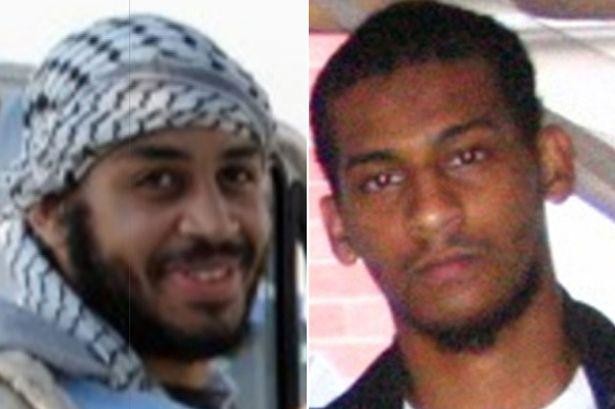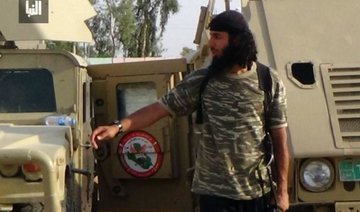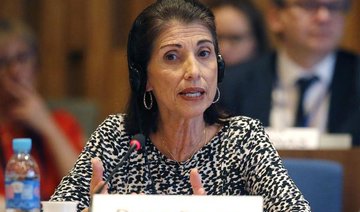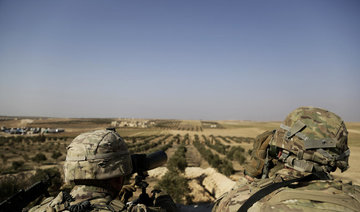LONDON: Daesh militant Alexanda Kotey, known for his part in a brutal murder squad, is thought to have been fleeing to Turkey when he was seized by US-backed Kurdish forces in northern Syria.
Kotey, 34, along with El Shafee Elsheikh, 29, was part of a notorious Daesh execution cell, known for participating in the brutal beheadings and torture of hostages, who knew them as the “Beatles” because of their British accents. “He was intending to escape toward Turkey with cooperation and coordination with friends of his on the Turkish side,” senior SDF official Redur Xelil told Reuters. “He is now under investigation with us,” he added. No information on Elsheikh was provided. A senior security official in Turkey described the claim as “nonsense.”
The pair were detained in January but American officials initially kept the news secret “to allow analysts more time to pursue the intelligence leads,” The New York Times said.
UK officials described the capture as a potential “treasure trove” of intelligence and are hoping to glean information on the whereabouts of John Cantlie, the British journalist captured by Daesh in 2012 alongside US journalist James Foley, who was beheaded in 2014.
Kotey and Elsheikh are already believed to have supplied valuable intelligence and could provide important insights on foreign fighters disbanded by the collapse of the so-called caliphate.
Tahir Abbas, a senior research fellow specializing in Islamophobia and radicalization at RUSI, a London-based think tank, told Arab News that their capture presented “vital and valuable opportunities” to gain greater insights into the workings of Daesh. “These individuals carry with them all sorts or knowledge and understanding of what went on inside” as well as “how people came from the UK and other European countries to Syrian and Iraq.”
Kotey, described by friends as a “quiet and humble” football fan of Ghanaian-Greek Cypriot origin, acted as a recruiter for Daesh and is believed to have encouraged several UK nationals to join the group. According to the US State Department, he “likely engaged in the group’s executions and exceptionally cruel torture methods, including electronic shock and waterboarding.”
Elsheikh also participated in the torture and had a reputation for “waterboarding, mock executions, and crucifixions” the US State Department said.
The cell’s frontman was Mohamed Emwazi, known as Jihadi John, who became notorious after appearing in Daesh propaganda videos depicting the execution of Western hostages, including Foley, UK aid workers David Haines and Alan Henning, US aid worker Abdul-Rahman Kassig and Japanese hostage Kenji Goto. He was killed in a US drone strike in 2015 following an extensive manhunt.
According to US officials the cell beheaded at least 27 Western hostages and was responsible for torturing many more. They were known for their brutality, frequently beating the hostages they held in Raqqa, who knew them by their Beatles names — Ringo, Paul, John and George.
A fourth member of the group Aine Davis is imprisoned in Turkey after being arrested near Istanbul in 2015. Like the others, Davis lived in West London, where they are believed to have met before traveling to Syria to join Daesh.
There is now speculation over whether the pair, who may have had their British citizenships revoked under powers available to the UK Home Office, will be repatriated to the UK or put on trial in the US. Their capture by US forces and alleged participation in the killing of US hostages could see some in the Trump administration push for them to be moved to Guantanamo Bay.
In his State of the Union address last month, Trump announced a decision to keep the controversial detention facility open: “I am asking Congress to ensure that in the fight against Isis and Al-Qaeda we continue to have all necessary power to detain terrorists wherever we chase them down, wherever we find them. And in many cases, for them, it will now be Guantanamo bay.”
Both UK MP Tobias Ellwood, whose brother was killed in a terrorist attack in Bali in 2002, and the mother of James Foley, have called for the pair to receive a fair trial. Diane Foley told the BBC: “I would like them to be brought to trial in the US but as long as they are brought to fair trial and detained and justice is served I would be most grateful.
“It does not bring James back but hopefully it protects others from this kind of crime.”
“I would like them to spend the rest of their lives being detained in a prison.”
Speaking on BBC Radio 4, Nicolas Henin, a former hostage who was held for 10 months, described the cell’s cruel treatment of captives. “I don’t like the word but yes, some of us have been tortured,” he said, adding that the men’s accents had clearly identified them as British.
“I will be extremely frustrated if they are not offered a fair trial, and I don’t think that the local authorities in northern Syria or that detention in Guantanamo would be justice,” he said. “I would like them brought back to Britain.”
All four members of the group are believed to have been radicalized in London. Kotey, a father of two who converted to Islam in his twenties, joined an aid convoy to Gaza in 2009 and never returned. Investigators believe he became radicalized while attending Al-Manaar mosque in Ladbroke Grove, alongside Emwazi.
“It’s right that they are returned to the UK and face justice accordingly,” Abbas, the research fellow at RUSI, said. “Yes they carried out undoubtedly heinous acts but they were, if their citizenship hasn’t been revoked, British citizens, who still have a claim to their Britishness on some level and we as a state should acknowledge that and process them through the justice system — that would be the right and fair thing to do and it would send the right signals.”
Elsheikh and his younger brother Mahmoud, who was killed while fighting for Daesh in Iraq, came from a family of Sudanese refugees. His mother Maha Elgizouli claimed her “perfect” son was influenced by the sermons of a radical West London Islamist cleric, Hani Al-Sibai, who once described the London bombings as a “great victory” for Al-Qaeda.
Egyptian-born Al-Sibai, 55, has been linked to numerous extremists, including Emwazi and Elsheikh, and is cited as an influence on the Tunisian terror group that trained Seifeddine Rezgui Yacoubi before he killed 38 tourists on a Tunisian beach in 2015.
Elgizouli said in an interview that she confronted the cleric and slapped him, saying “What have you done to my son?” After learning that Elsheikh was involved with the groups, she said: “That boy now is not my son. That is not the son I raised.”
Despite attempts by successive British governments to deport Al-Sibai he continues to live in West London.
The UK Home Office has faced similar problems with radical preachers in the past, notably Egyptian-born cleric Abu Hamza Al-Masri and Jordanian Abu Qatada, who was eventually deported to Jordan in 2014.
A report published in Oct. 2017 by The Soufan Center found that thousands of Daesh fighters had already returned to their home countries, including at least 425 to the UK — more than any other country in Europe.


How four British extremists went from West London to heading a brutal Daesh death cell
How four British extremists went from West London to heading a brutal Daesh death cell

Indonesia targets illegal mining on 190,000 hectares of forest land
JAKARTA: The Indonesian government could potentially seize mining activities across 190,000 hectares (733.59 square miles) of illegally cleared forest, the deputy forestry minister told a parliamentary hearing on Monday, as authorities tackle what they say is unlawful extraction in the resource-rich archipelago. Indonesia’s unprecedented crackdown, which has seen military-led teams take over palm plantations and mines, has unnerved the industry, pushing up global palm oil prices over concerns it will hit output, and more recently, powering rallies in the prices of metals like tin. “There were 191,790 hectares (mines) that do not have forestry use permits, which could be considered illegal,” Deputy Forestry Minister Rohmat Marzuki said. He did not name any of the companies involved or say how many were involved. Neither did he elaborate on what was being mined or provide any timeline for the seizures.
“The forestry task force has already obtained 8,769 hectares and this is still ongoing to reach 191,790 hectares,” he added.
“Along with the forestry task force, the forestry ministry remains committed in obtaining back the forest areas from illegal oil palm plantations and illegal mines,” Marzuki said.
The military-backed forestry task force said last week it had taken over 8,800 hectares of land where nickel, coal, quartz sand and limestone were being mined. It has also seized palm plantations across 4.1 million hectares (10.1 million acres), an area roughly the size of the Netherlands. Indonesia’s Attorney General has assessed potential fines of 109.6 trillion rupiah ($6.47 billion) for palm oil companies and 32.63 trillion rupiah for mining companies, for operations in forest areas.
“The forestry task force has already obtained 8,769 hectares and this is still ongoing to reach 191,790 hectares,” he added.
“Along with the forestry task force, the forestry ministry remains committed in obtaining back the forest areas from illegal oil palm plantations and illegal mines,” Marzuki said.
The military-backed forestry task force said last week it had taken over 8,800 hectares of land where nickel, coal, quartz sand and limestone were being mined. It has also seized palm plantations across 4.1 million hectares (10.1 million acres), an area roughly the size of the Netherlands. Indonesia’s Attorney General has assessed potential fines of 109.6 trillion rupiah ($6.47 billion) for palm oil companies and 32.63 trillion rupiah for mining companies, for operations in forest areas.
© 2026 SAUDI RESEARCH & PUBLISHING COMPANY, All Rights Reserved And subject to Terms of Use Agreement.












